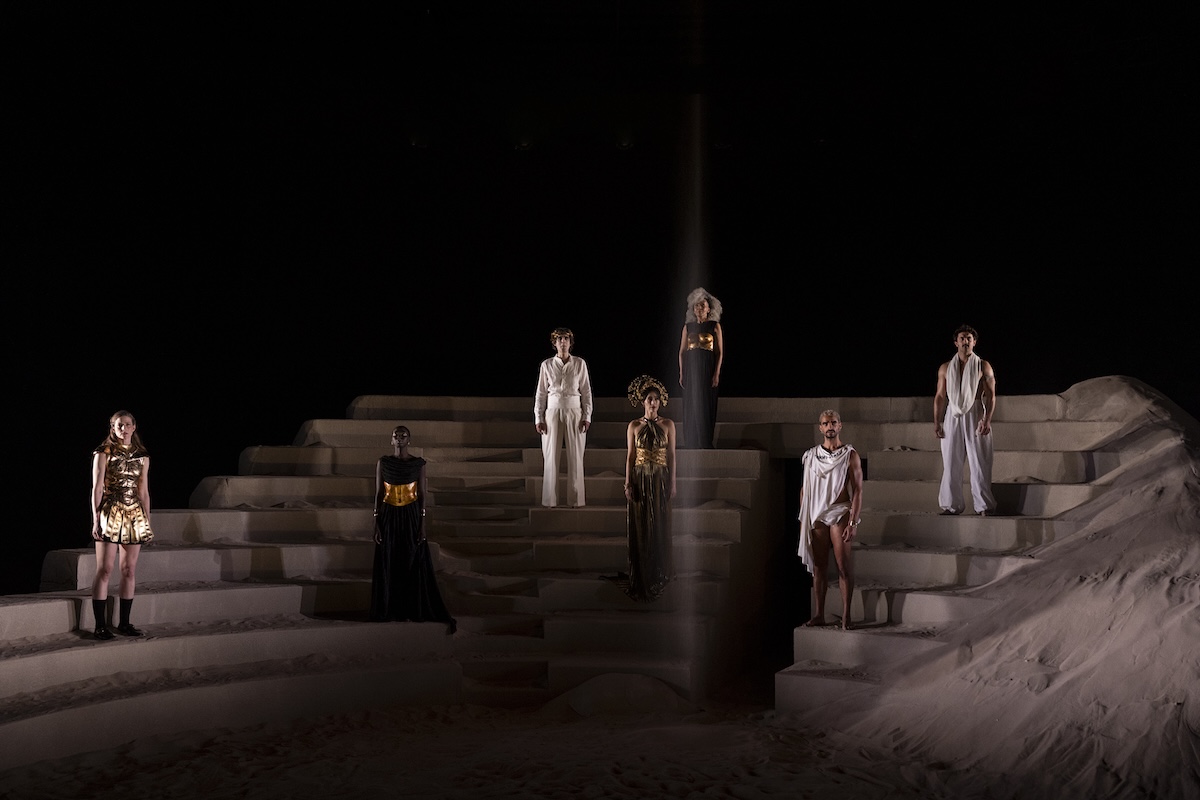Told and tweaked for millennia, the story of the Trojan War is playwright Tom Wright’s subject once again following his acclaimed 2008 adaptation, The Women of Troy.
He uses key moments in the city’s siege as a means of exploring timeless themes of war, including its futile destruction, and its layers of causation and justification. While almost entirely set in the classical past, Troy echoes through history to the conflicts of today.
It’s a complex, engrossing tale, elevated by impressive, sometimes astonishing design and theatricality in this world premiere Malthouse production directed by Ian Michael (whose CV includes Picnic at Hanging Rock, also written by Wright, who has a flair for adapting iconic texts).

Malthouse Theatre’s Troy: Photo © Pia Johnson
We meet numerous characters from Greek myth, including Hecuba, Queen of Troy, and her children, Hector and Cassandra. The invading Greeks include Agamemnon and Clytemnestra, the king and queen of Mycenae, their daughter Iphigenia, and the demi-god warrior Achilles.
In a clever move, we never see the face that launched a thousand ships; Helen mysteriously appears from time to time, distinctly veiled.
There are numerous other characters, and the cast of seven interpret multiple roles. This sometimes makes Troy difficult to follow for those, like me, who are hazy about the complexities of Greek mythology (which has many iterations).

Mark Leonard Winter and Lyndon Watts in Malthouse Theatre’s Troy: Photo © Pia Johnson
The script also challenges the audience with a steady flow of ideas and analysis. They are fascinating and often beautifully articulated, but perhaps too much to fully process and appreciate before we move to the next scene, the next array of characters, the next intellectual dive.
A highlight among them is Troy’s most overt foray into modernity. A group of archaeologists arrive on the site of the ancient city, which famously has nine layers of occupation through prehistoric to classical times. They ruminate on its inhabitants’ questionable sense of ownership of the land and the consequent wars. Their words ring true through time to the present.
Among other flashes of modernity are a trio discussing the war like earnest podcasters. Cassandra, whose words were misunderstood as mad ravings by those around her, uses a recording device then a moment of meta-theatre to demonstrate her sanity. The play’s denouement brilliantly recalls the weaselly words of the 21st century’s most dubious leaders.

Ciline Ajobong, Paula Arundell and Geraldine Hakewill in Malthouse Theatre’s Troy. Photo © Pia Johnson
The cast is excellent, deftly switching between characters and modes, often in the rousing, declarative English we have come to associate with classical theatre – making the occasional casual, Australian diction telling.
Paula Arundell is imperious as Hecuba, Geraldine Hakewill interprets Clytemnestra with both strength and fragility, and Danny Ball suggests Achilles is a bit more brawn than brains.
Elizabeth Blackmore’s Cassandra is a roguish outlier, Mark Leonard Winter is at his finest in Agamemnon’s final, most narcissistic scene, while Ciline Ajobong raises Iphigenia’s anxiety to a fever pitch.
Multitalented Lyndon Watts, seen most recently in Victorian Opera’s Abduction, seems underutilised as Achilles’ lover Patroclus. That is, until he appears as Helen – not as the speechless cipher other cast members presented her as previously, but as a rockstar hypnotising through song and sensuality during this production’s jaw-dropping abstract interpretation of the Trojan horse.
This scene is the ultimate triumph for Troy’s creative team, but it’s always visually engrossing and often aurally stimulating too. Dann Barber deserves an award or three for his set and costumes, which are inspired by classical design.

Geraldine Hakewill and Ciline Ajobong in Malthouse Theatre’s Troy. Photo © Pia Johnson
Lit with varied, almost palpable drama by Paul Jackson, the set is a substantial section of amphitheatre, its sharp lines softened and even obscured by pale sand. We see the past and present simultaneously, as this eternal architecture both emerges from and is buried under the sands of time – which sometimes falls spectacularly from on high in a thin stream, as if in a giant hourglass.
The most striking costume is Clytemnestra’s glamorous gold gown and headdress, while the skimpy togas for Achilles and Patroclus also catch the eye. There’s a consistent elegance, from pleats to breastplates, in black, white and gold – which makes Cassandra’s Blondie T-shirt all the more notable.
Composer Rosalind Hall’s throbbing song for the Trojan horse scene puts sound front and centre. As does sound designer Marco Cher’s thunder of modern warfare, which links the terror of Trojan civilians under attack to those of today with unsettling effect.
There is so much to delight in and think about during Troy’s 110 minutes, it probably rewards even more a second time. In any case, consider doing a bit of Homer-work first to maximise your enjoyment.
Troy plays at the Merlyn Theatre, The Malthouse, Melbourne, until 28 September.











Comments
Log in to join the conversation.